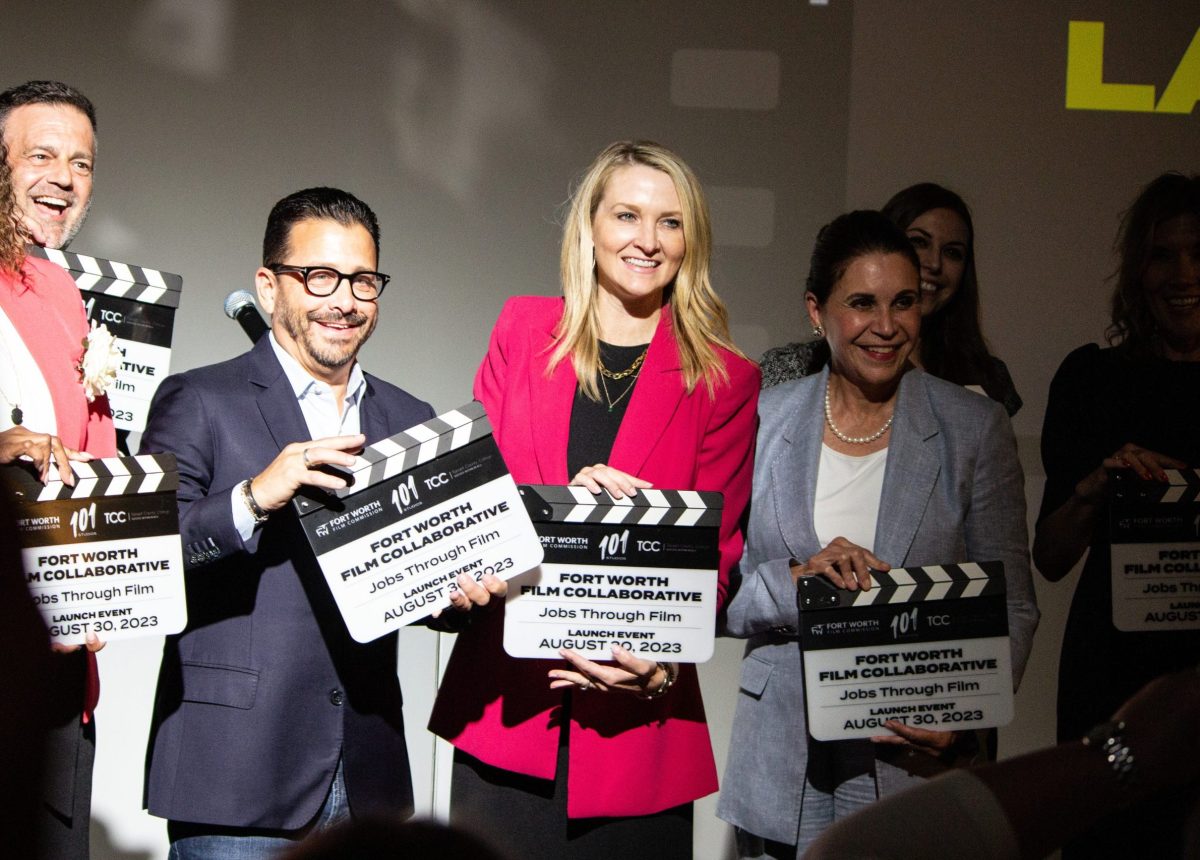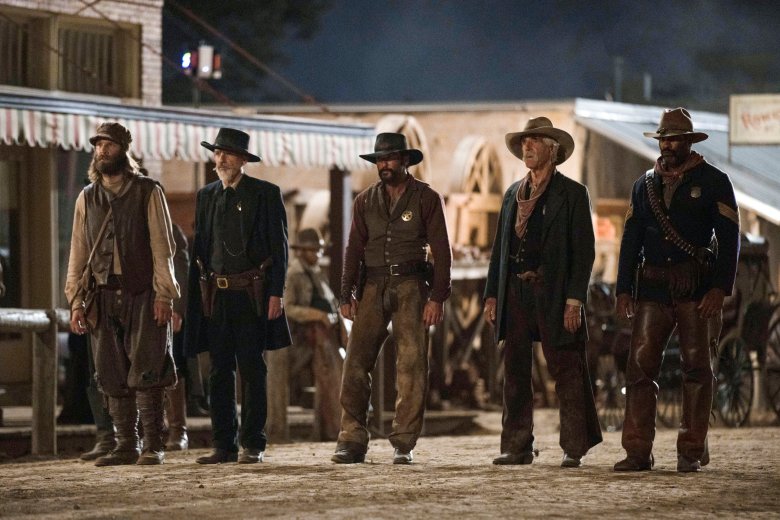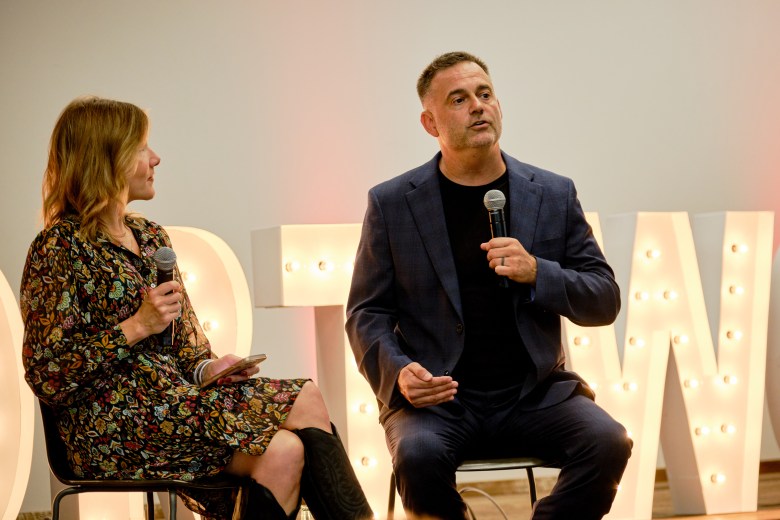
David Glasser, CEO of 101 Studios, Fort Worth Mayor Mattie Parker, Tarrant County College Chancellor Elva LeBlanc and others celebrate the launch of a new film industry training program at TCC. The reception took place at Backlot Studios, 305 S. Main St., on Aug. 30, 2023. (Marcheta Fornoff | Fort Worth Report)
AUSTIN — Fort Worth is projecting itself as a future filmmaking hub, drawing movie studios to Texas with state tax incentives and collaborative efforts.
Recent years have seen Fort Worth embrace fresh interest from the film industry, according to Jessica Hill, film commissioner and vice president of marketing for Visit Fort Worth, and John Hermansen, producer and production executive for 101 Studios.
The two spoke during a panel at The Texas Tribune Festival in Austin, where Visit Fort Worth’s presence as one of the event’s sponsors aimed to expand how Texans see the city.
Since 2021, Hermansen’s studio has filmed at locations within 50 miles of Fort Worth for Paramount+ series like “1883,” “Special Ops: Lioness” and “Lawmen: Bass Reeves” — all from Paschal High School alumnus and “Yellowstone” creator Taylor Sheridan. The film crews have converted nearby landscapes into settings like Montana, Mexico, Iran, New York and Washington, D.C.

Tim McGraw as James, Sam Elliott as Shea and LaMonica Garrett as Thomas of the Paramount+ original series 1883. (Courtesy photo | Emerson Miller / Paramount)
Hermansen said the productions have poured $325 million directly into the region — a number that reflects catering, equipment, props and over 100,000 hotel room nights.
They’ve put over 10,000 locals in front of cameras, and over 50,000 North Texas residents in crews behind them, Hermansen said.
“There’s an economic effect: we pay them, they pay their mortgage, they pay their kids’ school fees, they pay for their food, the money gets redistributed in Texas as we distribute it,” he said. “We’re paying people the money, and it’s staying inside the state to be regenerated inside the state.”

John Hermansen, producer and production executive for 101 Studios, right, talks with Fort Worth Film Commissioner Jessica Hill about what makes Fort Worth attractive for film studios on Sept. 6 at the 2024 Texas Tribune Festival in Austin. (Drew Shaw | Fort Worth Report)
Fort Worth is a “yes city” that collaborates with filmmakers, Hermansen said. Other cities that have historically seen studio traffic, like Los Angeles and Atlanta, are either more expensive or have more barriers for studios to film in.
“When we ask, can we shut down a road? Can we shoot in the park? At the museum? The answer is never ‘No,’” he said. “The answer is: ‘Well, we haven’t done that, but let’s figure it out together.’”
Five years ago, studios didn’t see Texas as an easy place to film, Hermansen said. Three factors determine a “good film state,” he said: film stages, workforce and tax credit.
North Texas already has the land diversity for film stages, with Fort Worth’s Stockyards, downtown and nearby undeveloped Hill Country appealing especially to productions set in the West.
To establish a strong workforce in Fort Worth, Hermansen’s studio and the city’s film commission partnered with Tarrant County College to create a Film Collaboration Certification program that prepares students for skilled labor in a film studio.
Since the four-week courses launched in 2023, enrollment has risen from less than 20 students to over 200, he said. Hill said they let students work at their own pace to become certified in working on set with hair, makeup, lighting and construction.
Texas has multiple programs to attract filmmakers with tax incentives. In 2007, the Legislature created the Texas Moving Image Industry Incentive Program and, two years later, the Media Production Development Zone Act.
The Legislature has recently revived the programs, approving a $200 million grant through the governor’s economic development fund in 2023, covering productions through August 2025.
Through the programs, qualified production projects could recapture 20% of their budgets over $3.5 million in tax credit, in addition to grants and film crew stipends.
The incentives make it easier for filmmakers like Hermansen to convince studios to keep filming in the state.
Statewide, the programs have drawn series like “The Chosen” to film in Midlothian, and HBO’s “Love and Death” and Apple TV+’s “The Last Thing He Told Me,” to film around Austin.
Smaller cities around Fort Worth like Cleburne, Strawn and Granbury have seen their communities transformed by seasons of filming. Even when a studio wants to renovate their downtowns into 1800s Western scenes, the communities see past the hassle and welcome the economic opportunity, Hermansen said.
The influx of activity shows no signs of stopping. In the near future, Hermansen expects more studios and shows to flood North Texas.
Content retrieved from: https://fortworthreport.org/2024/09/11/no-need-to-live-in-la-fort-worth-reel-serious-about-being-a-movie-makers-golden-ticket/.